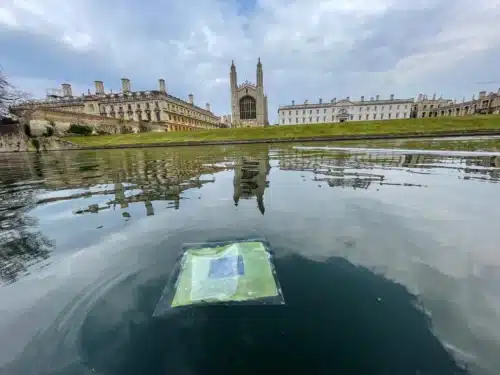These floating artificial leaves are inspired from photosynthesis and can generate clean energy using sunlight and water.
Energy is one of the most crucial factors in almost every aspect of our lives. Whether it is technical or non-technical, energy is being consumed in one or the other way. And this makes it a huge concern for development. In the past few decades the concept of clean energy has helped positively in that concern but yet the problem seems to stand tall.
Researchers have developed a means to generate clean energy using the concept of photosynthesis. They have developed artificial leaves that can generate energy using sunlight and water. Researchers at University of Cambridge have designed an ultra-thin, flexible device that resembles leaves and even work on their principle of converting sunlight into food.

Credit: Virgil Andrei
In 2019, researchers at Cambridge developed an Artificial Leaf which made syngas, an intermediate in production of many chemicals and pharmaceuticals, from sunlight, carbon dioxide, and water. But the device turned out to be very bulky.
The new version of the device is inspired from the electronics industry and has adapted the concept of miniaturization. Depositing light absorbers onto lightweight substrates and protecting them against water infiltration was a major challenge which needed to be solved. Researchers solved the problem using thin-film metal oxides, and materials known as perovskites, which can be coated onto flexible plastic and metal foils. The device was covered in micrometer-thin, water-repellent carbon-based layers that prevented moisture degradation.
“This study demonstrates that artificial leaves are compatible with modern fabrication techniques, representing an early step towards the automation and up-scaling of solar fuel production,” said Dr. Virgil Andrei from Cambridge’s Yusuf Hamied Department of Chemistry, the paper’s co-lead author. “These leaves combine the advantages of most solar fuel technologies, as they achieve the low weight of powder suspensions and the high performance of wired systems.”
Since the low-cost, autonomous devices are light enough to float, they could be used to generate a sustainable alternative to gasoline without taking up space on land. If it were scaled up, the artificial leaves could be used on polluted waterways, in ports, or even at sea, and could help reduce the global shipping industry’s reliance on fossil fuels.







